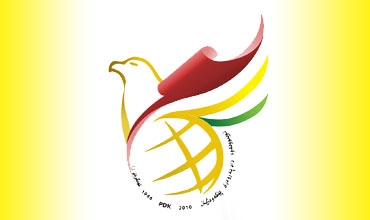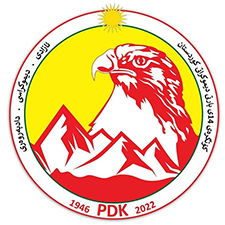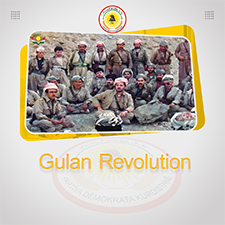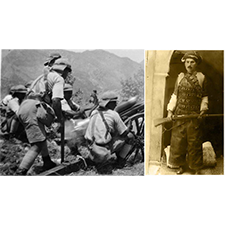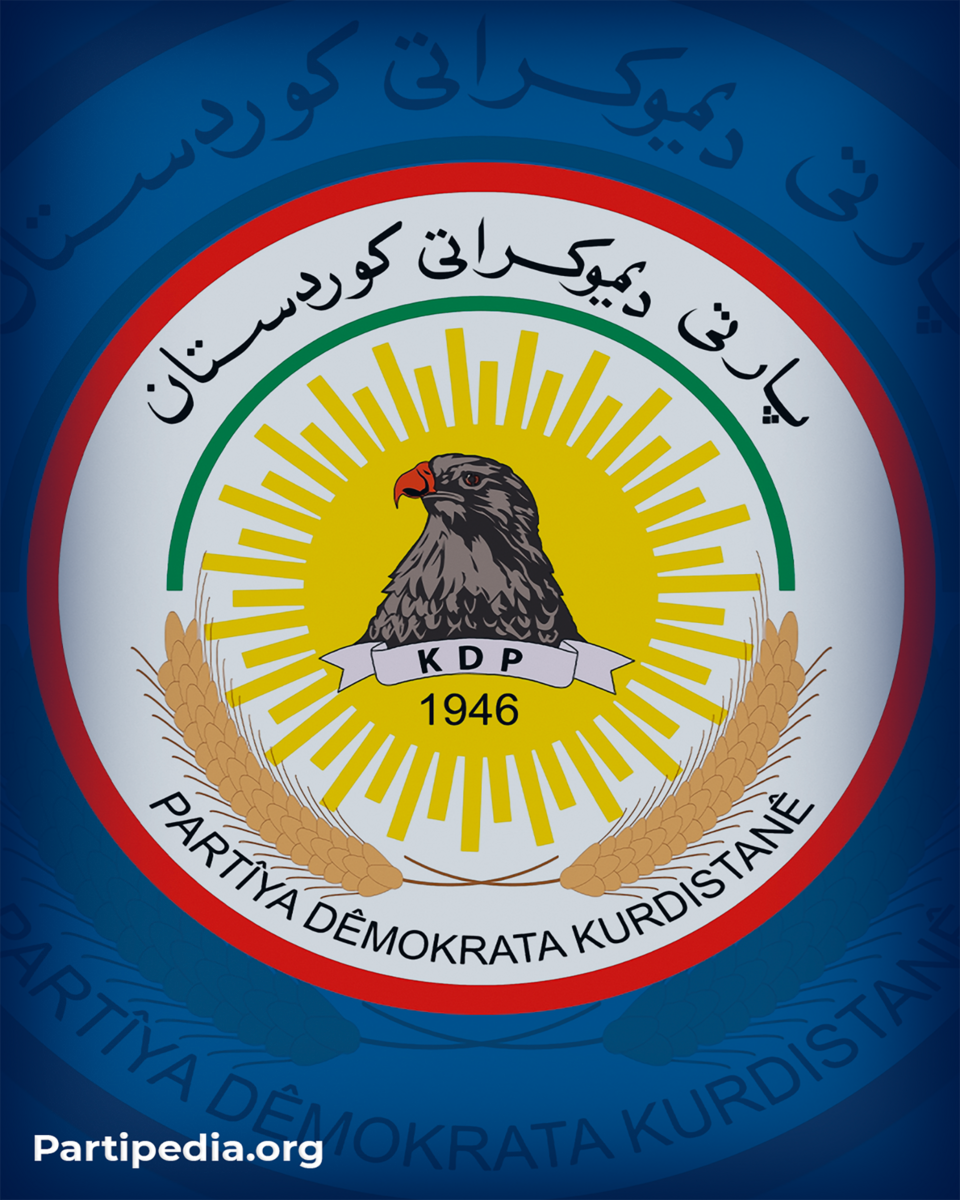Holding the Congress
On December 11, 2010, under the slogan of "Renewal, Justice, Coexistence", was held in Erbil, in the presence of 350 personalities, including President Jalal Talabani, he former president of Repubilc of Iraq. President Masoud Barzani awarded the Barzani Immortality Medal to Gwen Roberts, a journalist who is a friend of the Kurds.
Eight committees were formed to conduct the work of the congress, including the Program Committee, the Rules Committee, the General Organization Committee, the Finance Committee, the Complaints Committee, the Media Committee, the Peshmerga Committee and the Committee of Professional and Mass Organizations. At the congress, a 10% requirement for women's membership in the KDP leadership council was set, in the third gate of Chapter 22 of Article 217 of the program and in Article 17, paragraph 2, point 2 of the rules of procedure. For the first time in the history of KDP, the previlage of participation for women was implemented at the 13th Congress. It should be noted that only one woman was elected as a member of the Central Committee in the fifth, ninth, eleventh and twelfth congresses.
The structure of the Kurdistan Democratic Party (KDP) based on the rules of procedure of the 13th Congress was as follows: Base, Organizational Committee, Regional Committee, Branch Committee, Provincial Leadership Council, Leadership Council, Political Bureau, Secretary of Political Bureau, Vice President and President. The monitoring and follow-up committees were also appointed by the Leadership Council and approved by the president.
At this congress, two new terms were introduced into the KDP structure: the first is Base, which previously was cell or the main cell, or a mixture of both, the second one was the Leadership Council, which until 2018 was only in Erbil, Sulaimani, Kirkuk-Garmyan provinces, which included the scope of activities in Kirkuk, Diyala and part of Sulaimani. For some unkown reason, Duhok and Mosul were still governed in the old way, although Duhok was within the Kurdistan Region. Baghdad province was excluded from this system, and Europe and the United States, which had two branches, remained the same.
The most outstanding institution of the KDP after this congress was the Council of Experts, appointed by the leadership council and established under Article 15 of the rules of procedure. Therefore, due to the importance of its functions, this article consists of four paragraphs and several points. As mentioned earlier, a similar council was registered in the rules of procedure in 1993, at the eleventh congress of KDP under the name of “Advisory Council”.
Recognized and official institutions of the PKK:
1- Organization Bureau
2- Cultural and media institutions
3- Bureau of Relations
4- Board of Mass and Professional Organizations
5. The Electoral Agency
6- Bureau of Administration and Finance
At the congress, President Massoud Barzani was re-elected by a unanimous vote of the delegates and Nechirvan Barzani was elected as the vice president. The members of the leadership council were elected as follows:
1- Masrour Barzani
2- Sidad Barzani
3- Karim Sinjari
4- Yousef Barzani
5- Dr. Roj Shaweis
6- Hoshyar Zebari
7- Fazel Mirani
8- Nazhat Hali Mohammed
9- Nawzad Hadi Mawlod
10- Bayan Sami Abdulrahman
11- Qadir Qachakh
12- Dr. Kamal Kirkuki
13- Salah Delo
14- Azad Barwari
15- Aras Haso Mirkhan
16- Sirwan Barzani
17- Sarbast Lazgin Abdulrahman, known as Sarbast Sinduri
18- Ali Hussein Ahmad
19- Mr. Amin Mustafa Amin, known as Kakamin Najjar
20- Nuri Hama Ali
21- Dr. Chenar Saad Abdullah
22- Dr. Pashtiwan Sadiq Abdullah
ur- Hemn Ahmad Hama Salih, known as Hemn Hawrami
AB- Abdulkhaliq Abdulsalam Mustafa, Abdulkhaliq Babiri
25- Ramzi Shaaban
26- Faraidoon Jawanroyi
27- Zaim Ali
28- Diyari Hussein Osman, known as Diyari Hussein Beg
29- Rebwar Yalda
30- Dilshad Shahab Haji
31- Jafar Ibrahim Haji, known as Jafar Emini
32- Arif Taifur
33- Younis Rojbayani
34- Sarbast Omar Hassan, known as Sarbast Truanshi
35- Sasan Auni
36- Hiwa Ahmad Mustafa
37- Adham Osman Sheikh Ahmad, also known as Adham Barzani
38- Mahmoud Hashim Elias, also known as Mahmoud Yazidi
39- Ali Auni Niamat
40- Mahmoud Mohammed
41- Khasraw Abdullah Ismail, known as Khasraw Goran
42- Abdulmuhaimen Barzani
43- Mohammed Mahmoud Abdullah, known as Mohammed Harki
44- Dr. Ali Tatar Tofiq
45- Ahmed Adham Abdul Jabbar, also known as Ahmed Kani
46- Ezeddin Barwari
47- Safin Dzeyi
48- Najat Ali
49- Shirin Amedi
50- Evin Tahir Ibrahim, known as Evin Hruri
51- Nazanin Mohammed Wasu.
Reserve members of the leadership council:
1- Omar Osman Mergasuri
2- Abdullah Ali
3- Ako Chawshin
4- Bland Ismail Jarjis
5- Qadir Qadir
6- Akbar Haider
7- Sarbast Babiri
8- Dr. Hamid Darbandi
9- Dr. Vian Sabri
On Friday, December 17, 2010, the closing message of the congress was read out by Dr. Pirot Ahmad, Chairman of the Presidency Committee of the 13th Congress. After the meeting of the Leadership Council, the members of the Political Bureau were elected from the following comrades:
1- Masrour Barzani
2- Fazel Mirani
3- Dr. Roj Nuri Shaweis
4- Hoshyar Zebari
5- Azad Barwari
6- Dr. Kamal Kirkuki
7- Karim Sinjari
8- Zaim Ali
9- Mahmoud Mohammed
10- Faraidoon Jawanroyi
11- Salah Delo
12- Rebwar Yalda
13- Jafar Emini
14- Kakemin Najjar
15- Ezeddin Barwari
Sources:
• مێژووی پارتی دیموکراتی کوردستان، كۆنگره و كۆنفرانس (پرۆگرام و پهیڕهوی ناوخۆ)، دهستهی ئینسكلۆپیدیای پارتی دیموکراتی کوردستان، بهرگی دووەم، (ههولێر- چاپخانهی رۆكسانا- ٢٠٢١).
• كۆنگرهی ١٣ی پارتی دیموكراتی كوردستان دهستی بهكارهكانی كرد، ڕۆژنامهی خهبات، ئۆرگانی پارتی دیموكراتی كوردستان، ژماره ٣٦٤٥، ههولێر، یهكشهمه، ١٢ی كانونی یهكهمی ٢٠١٠ز.
• له دووهم ڕۆژی كۆنگرهی ١٣دا ژمارهیهك لیژنه پێكهات، ڕۆژنامهی خهبات، ئۆرگانی پارتی دیموكراتی كوردستان، ژماره ٣٦٤٦، ههولێر، دووشهمه، ١٣ی كانونی یهكهمی ٢٠١٠ز.
• پارتی دیموكراتی كوردستان، پرۆگرام و پهیڕهوهی ناوخۆی كۆنگرهی سێزدهیهم، (بێ شوێن ـ بێ ساڵ).
• سهرۆك بارزانی به تێكڕای دهنگی ئهندامانی كۆنگرهی ١٣ به سهرۆكی پارتی دیموكراتی كوردستان ههڵبژێردرایهوه، ڕۆژنامهی خهبات، ئۆرگانی پارتی دیموكراتی كوردستان، ژماره ٣٦٤٨، ههولێر، چوارشهمه، ١٥ی كانونی یهكهمی ٢٠١٠ز.
• نێچیرڤان بارزانی به تێكڕای دهنگ به جێگری سهرۆكی پارتی ههڵبژێردرا، ڕۆژنامهی خهبات، ئۆرگانی پارتی دیموكراتی كوردستان، ژماره ٣٦٤٨، ههولێر، چوارشهمه، ١٥ی كانونی یهكهمی ٢٠١٠ز.
• شهعبان عهلی شهعبان، ههندێك زانیاری سیاسی و مێژوویی، چاپی سێیهم، (ههولێر ـ چاپخانهی ڕۆژههڵات ـ ٢٠١٣ز).
• ئهندامانی نوێی ئهنجوومهنی سهركردایهتی پارتی دیمكراتی كوردستان، رۆژنامهی خهبات، ژماره ٣٦٥٢، ههولێر، دووشهنه، ٢٠ی كانونی یهكهمی ٢٠١٠ز.
• پایتهخت... كۆنگرهی ١٣ی پارتی دیموكراتی كوردستان كۆتایی بهكارهكانی هێنا، ڕۆژنامهی خهبات، ئۆرگانی پارتی دیموكراتی كوردستان، ژماره ٣٦٥١، ههولێر، یهكشهمه، ١٩ی كانونی یهكهمی ٢٠١٠ز م.




